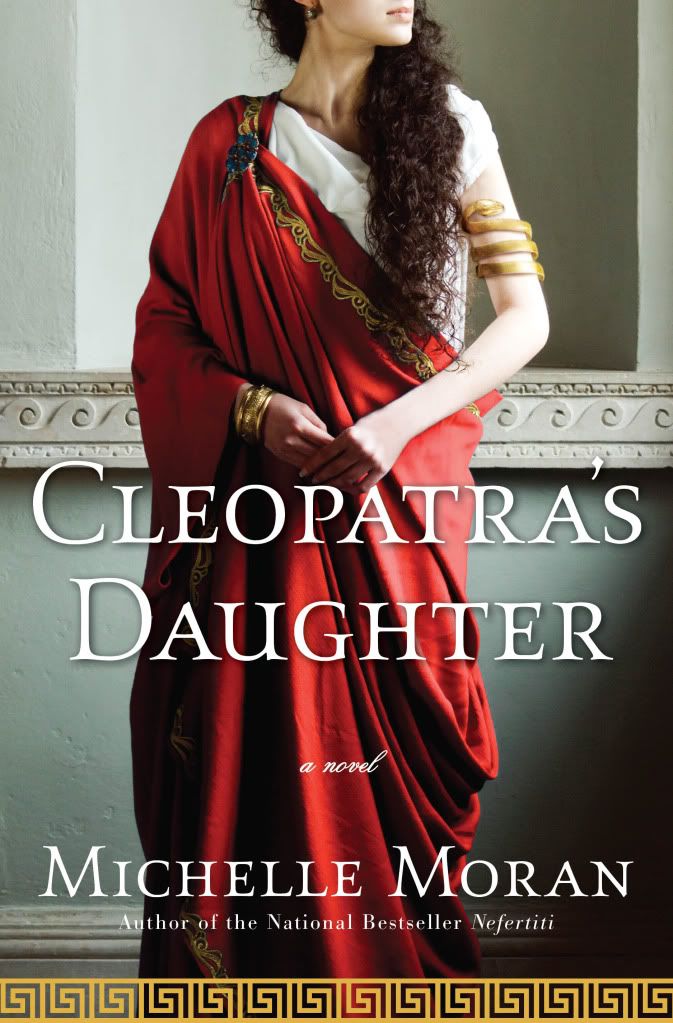
Cleopatra's Daughter
by Michelle Moran
by Michelle Moran
Cover: Pretty. I like the color scheme-- all red and gold, and the colors are also wrapped around the book to the back cover, too.
Summary: Cleopatra VII, last of the Egyptian pharaohs, has taken her own life, and so has her Roman husband, Marc Antony. They leave their kingdom in ruins and at the mercy of Octavian, Julius Caesar's appointed heir. But the vast empire isn't all they leave behind... their three surviving children must fight to survive the end of their world.
Cleopatra Selene and Alexander Helios are the eldest; twins that Cleopatra used to know as her "Moon and Sun." Ptolemy is the youngest, and the first to fall; he passes without ever setting foot in Rome. Selene and Alexander are left alone, prisoners in the house of Octavian's sister, wondering every day whether it will be their last. Rebels roam the streets, threatening Caesar's power as well as the survival of the Egyptian princes. We see the changing of Rome through the eyes of Selene, and the changing of a young girl into a woman.
My Review: I was lucky enough to get an advance copy from the author, and as soon as it landed on my porch (which was at night, for whatever reason), I ripped open the package and read through it. I will say right away: this was a book that I didn't want to finish, because I liked it too much!
This is the kind of book that I wish had existed back when I was the Young Adult target age. I used to read all the Ann Rinaldi historical fiction novels, the Dear America and Royal Diaries historical books, and this would easily fit alongside those. I hope that they market this book a little towards the Young Adult sector as well, because there is so much to be had from it for readers of all age levels.
Selene is entirely believable as a young teenager. At first she is traumatized by witnessing both of her parents' deaths, and is wrapped up within her own world. She will get back to Alexandria at any cost, to take her rightful place on the throne beside her brother. (sidenote: Egyptians had a tradition of symbolically "marrying" their siblings in order to further legitimize their claim to the throne. Cleopatra VII was "married" to her younger brother, and typically referred to him as "little husband," though these marriages were, for all intents and purposes, entirely platonic) Everything about her new home in Rome is disagreeable to her, from the humiliating rituals she must participate in as a servant of Octavian to the rampant sexism and violence that run through the streets.
Here, I would like to give a shoutout to Moran's writing talents and say how much I appreciated her attention to detail. As I may have mentioned, the Classical Age is not my forte when it comes to history (though heaven knows I would like to learn sooo much more about it), so I felt like I was learning about daily life in Rome along with Selene. While I got so much out of the reading, I never felt bogged down in the details. She doesn't just throw something in without a purpose to furthering the plot and the character development.
I also loved the side characters we meet along with Selene. Ovid, Virgil, the emperor Tiberius, and more appear, creating a fun kind of "Which historical figure will appear next?" sort of atmosphere. And the great thing is that Selene would have actually met all these people that, today, we revere as pioneers of their respective fields.
Selene was a unique and important figure in history, particularly because she was educated. Roman women, especially at the onset of Octavian (Augustus)'s rule, were meant to maintain the household and nothing more. As a daughter of Egypt, she was educated by world renowned scholars in the library of Alexandria, and her mother had always ensured that she was raised alongside her brothers, rather than beneath them. She is a strong and likeable heroine, and one that I was sad to say goodbye to.
My only qualm about Selene is how anti-slavery she is in this book. She comes off as "surprised" by the presence of slavery. She treats the horrible slavery of Rome like it is a unique activity to that region, and it wasn't. Egypt had slaves as much so as Rome, from what I know (though if I'm wrong, please correct me). I would have preferred to see Selene "mending her ways" and learning that slavery is wrong, rather than acting like she had never seen it before. I just thought that was a slight anachronism.
Overall, this was very high quality historical fiction and a wonderful story, and I look forward to reading more from this author in the future.
Buy this book on Amazon
Visit the author's website








Great review and now you have made me add yet another book to my list of must reads. Interested in the portrayal of peripheral historical figures. I didn't realise this was a YA, I know at least one young history fan who would love this. Thanks for the valuable heads up on this one.
ReplyDelete